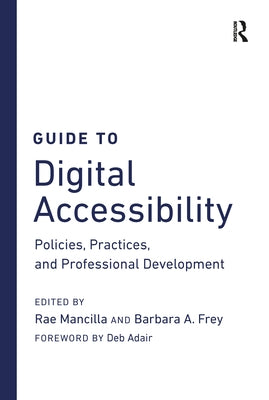Before you leave...
Take 20% off your first order
20% off
Enter the code below at checkout to get 20% off your first order
Discover summer reading lists for all ages & interests!
Find Your Next Read

The collective depth and tenure of experience of the authors in advancing accessibility practice is truly exceptional. In practical terms, the organization of the book makes clear the work to be done and the imperative for doing it. It is about understanding the context for accessibility and making change happen in policy, practice, and professional development. At QM, our position is straightforward. A course is not quality unless it is accessible for all. This book represents the many ways our community is walking that talk. -- from the Foreword by Deb Adair, Executive Director of Quality Matters
Approximately 8.5% of the general population of the United States has a disability affecting their computer and Internet use, which translates to over 28 million people in the U.S. alone whose disability impacts their access to digital content. Recent data indicates that around 19% of undergraduate students have a disability, yielding consequential implications for institutions of higher education. Regardless of disabilities or environmental constraints, educators have a legal and ethical responsibility to create online learning experiences that are accessible and usable by all learners.
Addressed to higher education administrators, instructional designers, faculty developers, and faculty, this edited volume showcases the experiences and practices of Quality Matters institutions around the core tenets of digital accessibility, offering examples of policy, processes, practices, tools, and professional development. The contributors represent a carefully curated body of institution types and classifications to ensure that all readers can transfer concepts into the contexts of their respective institutions.
The book situates the digital accessibility movement within the context of major federal legislation, such as the Americans with Disabilties Act of 1990. It traces the evolution of Web Content Accessibility Guidelines for online course design and professional development based on the Quality Matters framework.
Subsequent chapters describe the evolution of accessibility policy development as a driver of organizational culture, as well as a continuum of course design practices that can be implemented to proactively develop inclusive instructional materials.
The Guide concludes by identifying a myriad of professional development formats for fostering accessibility knowledge and skill acquisition, including asynchronous workshops, micro credentials, and train-the-trainer models, sharing evaluation protocols that foster continuous improvement.
Written for practitioners by practitioners, this book addresses vital compliance issues and maps a range of proven practices that will enrich the learning experience of all learners in digital environments.
Rae Mancilla, Ed.D., (she/her) is the Assistant Director of Online Learning for the School of Health and Rehabilitation Sciences at the University of Pittsburgh, Pennsylvania, where she leverages over a decade of curriculum development, instructional design, teaching, assessment, and project management expertise. She is also an active educator and researcher, instructing courses at the graduate and undergraduate levels. In addition, Rae serves as a Peer Reviewer and Research Colleague for Quality Matters and a bilingual Peer Evaluator for the Middle States Commission for Higher Education. Her research interests include the professional development of instructional designers, language learning and technology, digital accessibility, and program evaluation. Her scholarship has been published in peer-reviewed journals, including the Journal for Applied Instructional Design, Applied Linguistics, the American Journal of Distance Education, and Language, Learning, and Technology. Recent publications include the QM Digital Accessibility White Paper Series. Rae also reviews manuscripts for journals, including the American Journal of Distance Education, Applied Linguistics, and the International Journal of Applied Linguistics.
Barbara A. Frey, D.Ed., (she/her) is an Assistant Professor with the School of Education at Point Park University in Pittsburgh, Pennsylvania, and an Instructional Design Consultant with the University of Pittsburgh. She is also an active Quality Matters Facilitator, Master Reviewer, and Research Colleague. Throughout her career, Barbara has collaborated with hundreds of faculty on the design and development of traditional, online, hybrid, and massive open online courses (MOOCs). Her work has resulted in award-winning programs including several Blackboard Catalyst Awards. She has served as a Peer Evaluator for the Middle States Commission for Higher Education. Barbara is co-author of the book Distinctive Distance Education Design: Models for Differentiated Instruction. In addition, she has published numerous book chapters and scholarly articles in the Journal of Applied Instructional Design, Journal of Asynchronous Learning Networks, Journal on Excellence in College Teaching, TechTrends, and the International Journal of Information and Communication Technology Education. Most recently, she co-authored the QM Digital Accessibility White Paper Series.
Thanks for subscribing!
This email has been registered!
Take 20% off your first order
Enter the code below at checkout to get 20% off your first order